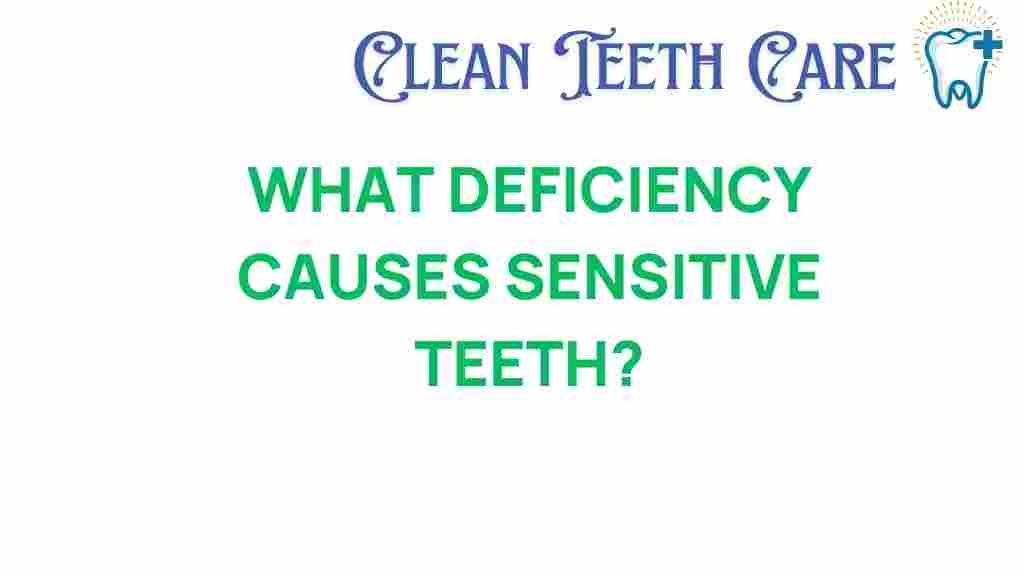Understanding Sensitive Teeth and Their Hidden Deficiencies
Sensitive teeth can be a painful and frustrating experience, affecting your daily life and enjoyment of food. Many people suffer from tooth sensitivity, which can be a sign of underlying dental health issues. One of the less discussed causes of sensitive teeth is vitamin deficiency. In this article, we will explore the connection between sensitive teeth, nutritional deficiencies, and proper oral care, while shedding light on the importance of minerals like calcium and magnesium in maintaining strong enamel and healthy teeth.
The Connection Between Sensitive Teeth and Dental Health
Tooth sensitivity often arises due to various factors, including:
- Enamel erosion
- Gum recession
- Dental cavities
- Cracked or fractured teeth
- Excessive brushing or grinding
However, one critical aspect that many overlook is the role of nutrition and vitamin deficiencies. A lack of essential vitamins and minerals can significantly impact your dental health, leading to increased sensitivity.
How Nutrition Affects Dental Health
The nutrients you consume play a vital role in maintaining your oral health. Key vitamins and minerals that are essential for strong teeth and gums include:
- Calcium: Crucial for maintaining strong tooth structure.
- Magnesium: Supports calcium absorption and is essential for bone health.
- Vitamin D: Enhances calcium absorption and helps keep your teeth strong.
- Vitamin C: Important for gum health and healing.
- Vitamin K: Plays a role in bone metabolism and may help in preventing tooth decay.
Not getting enough of these nutrients can lead to weakened enamel, leading to increased tooth sensitivity and other dental issues.
Understanding Enamel Erosion and Its Impact on Tooth Sensitivity
Enamel is the hard outer layer of your teeth that protects them from decay and sensitivity. When enamel erodes, it exposes the underlying dentin, which contains tiny nerve endings. This exposure can lead to sensitivity, especially when consuming hot, cold, or sweet foods.
Causes of Enamel Erosion
There are several factors that contribute to enamel erosion, including:
- Acidic Foods and Beverages: Citrus fruits, soda, and wine can wear away enamel.
- Brushing Too Hard: Aggressive brushing can damage enamel.
- Acid Reflux: Stomach acids can erode enamel when they reach the mouth.
- Dry Mouth: Saliva protects enamel; a lack of it can lead to erosion.
To prevent enamel erosion, it’s essential to adopt good oral care practices and ensure you are consuming adequate nutrition.
Step-by-Step Process to Combat Sensitive Teeth
If you are experiencing sensitive teeth, here is a step-by-step guide to help manage and potentially reverse the condition:
1. Assess Your Diet
Begin by evaluating your current dietary habits. Ensure you are incorporating foods rich in the necessary vitamins and minerals. Focus on:
- Leafy greens (rich in calcium and vitamin K)
- Dairy products (high in calcium)
- Fatty fish (source of vitamin D)
- Nuts and seeds (rich in magnesium)
- Citrus fruits (for vitamin C)
2. Practice Good Oral Hygiene
Commit to a daily oral care routine that includes:
- Brushing twice a day with a soft-bristled toothbrush
- Flossing daily to remove plaque between teeth
- Using fluoride toothpaste to strengthen enamel
3. Limit Acidic Food and Drink Intake
Reduce consumption of acidic items such as:
- Soft drinks
- Citrus fruits and juices
- Vinegar-based dressings
When consuming these, rinse your mouth with water afterward to neutralize the acids.
4. Stay Hydrated
Drink plenty of water throughout the day to help maintain saliva production, which protects enamel.
5. Visit Your Dentist Regularly
Ensure you have regular dental check-ups and cleanings. Your dentist can identify early signs of enamel erosion and sensitivity and provide treatments such as fluoride applications or desensitizing toothpaste.
Troubleshooting Tips for Sensitive Teeth
If you continue to experience tooth sensitivity despite making dietary and hygiene changes, consider the following troubleshooting tips:
Identify Potential Allergens
Sometimes, certain ingredients in dental products can cause sensitivity. If you suspect this might be the case, try switching to hypoallergenic toothpaste or mouthwash.
Monitor Your Teeth Grinding
Grinding your teeth can lead to enamel wear and increased sensitivity. If you suspect you grind your teeth, consult with your dentist about possible solutions, such as a night guard.
Consider Supplements
If you suspect a vitamin deficiency, discuss with your healthcare provider about the possibility of taking supplements, particularly for calcium, magnesium, and vitamin D.
Conclusion: Prioritizing Nutrition for Healthy Teeth
In conclusion, sensitive teeth can be a sign of underlying issues related to dental health and nutrition. By understanding the critical role that vitamins and minerals play in maintaining strong enamel, you can take proactive steps to improve your dental health.
Remember to:
- Focus on a balanced diet rich in essential nutrients.
- Maintain good oral hygiene practices.
- Limit acidic foods and beverages.
- Stay hydrated and visit your dentist regularly.
By addressing these factors, you can help mitigate the discomfort of sensitive teeth and improve your overall dental health. For further information on improving oral care, check out this helpful resource. For specific dietary advice, consider consulting with a registered dietitian or healthcare professional.
Take charge of your dental health today and enjoy a pain-free life!
For more tips on maintaining oral health, visit our dental care blog.
This article is in the category Conditions and created by CleanTeethCare Team
